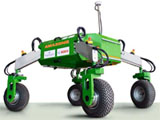Agricultural and Biological Systems Engineering, Department of

Department of Agricultural and Biological Systems Engineering: Faculty Publications
ORCID IDs
Document Type
Article
Date of this Version
2021
Citation
Transactions of the ASABE [American Society of Agricultural and Biological Engineers] 64:3 (2021), pp. 987–995.
doi: 10.13031/trans.14422
Abstract
Discipline-based education research (DBER) is research activity aimed at investigating “learning and teaching in a discipline from a perspective that reflects the discipline’s priorities, worldview, knowledge, and practices” for the purpose of producing research-based evidence to improve education in that discipline. DBER arose out of concerns about the quality of post-secondary science education. Physics, chemistry, engineering, biology, geosciences, and astronomy education each have unique DBER histories in the U.S. that date back to the late 1800s or early 1900s when colleges and university systems were expanding and formalizing. The DBER fields accelerated in the 1950s and 1960s as a result of the Space Race and in subsequent periods of concern about national competitiveness. For engineering education specifically, Mann argued for the recognition of engineering education research as a viable research enterprise for engineering faculty in the Mann report, the first major study of the state of engineering education. In 1955, the “encouragement of experiments in all areas of engineering education” was a top recommendation in the Grinter Report (1994). Each DBER field, including those that have emerged since the original six, including mathematics, has been on a path to meet the criteria of a full-fledged field of scientific inquiry, as described by Froyd and Lohmann (2014). This means that each field has, or is in the process of acquiring, structure (e.g., national and international societies, academic recognition, and multiple modes of dissemination including archival research journals), distinct research (e.g., knowledge bases, theories, and lines on inquiry), and outcomes (e.g., implications for practice).
. . .
The purpose of this article is to challenge us to build a robust agricultural and biological engineering DBER community for advancing educational practices and engaging in education research. To spur us on, this article uses specific examples of new frontiers in each of the five areas of engineering education research couched in an overarching theme of authentic learning. The five areas of engineering education research are learning systems, diversity and inclusiveness, learning mechanisms, assessment, and epistemologies. Authentic learning refers to learning strategies employed in the classroom that mimic real-world problem-solving in that the learning tasks involve something a practitioner would actually do, application of higher-level thinking skills, natural social interactions in a community, and opportunities for students to direct their own learning. This pedagogical model is selected because most education research with the potential to transform engineering education can be linked to closing the gap between school learning and work in the field.
In the following sections, each area of engineering education research is briefly described. Potentially transformative educational practices or trends in the growing knowledge-base that typifies that area are presented and linked to authentic learning. Potential impacts for agricultural and biological engineering conclude the discussion of each research area.
--Discipline-based education research can provide unique insights for agricultural and biological engineering.
--Authentic learning has the potential to transform teaching practices and student learning.
--Work in the five areas of engineering education research provides a foundation for discipline-specific inquiry.
--An agricultural and biological engineering education research agenda is advised.
Included in
Bioresource and Agricultural Engineering Commons, Educational Methods Commons, Environmental Engineering Commons, Higher Education and Teaching Commons, Other Civil and Environmental Engineering Commons, Scholarship of Teaching and Learning Commons, Science and Mathematics Education Commons


Comments
Copyright © 2021 American Society of Agricultural and Biological Engineers
Open access: "This work is licensed under a Creative Commons Attribution– Non-Commercial–No-Derivatives 4.0 International License." https://creativecommons.org/licenses/by-nc-nd/4.0/